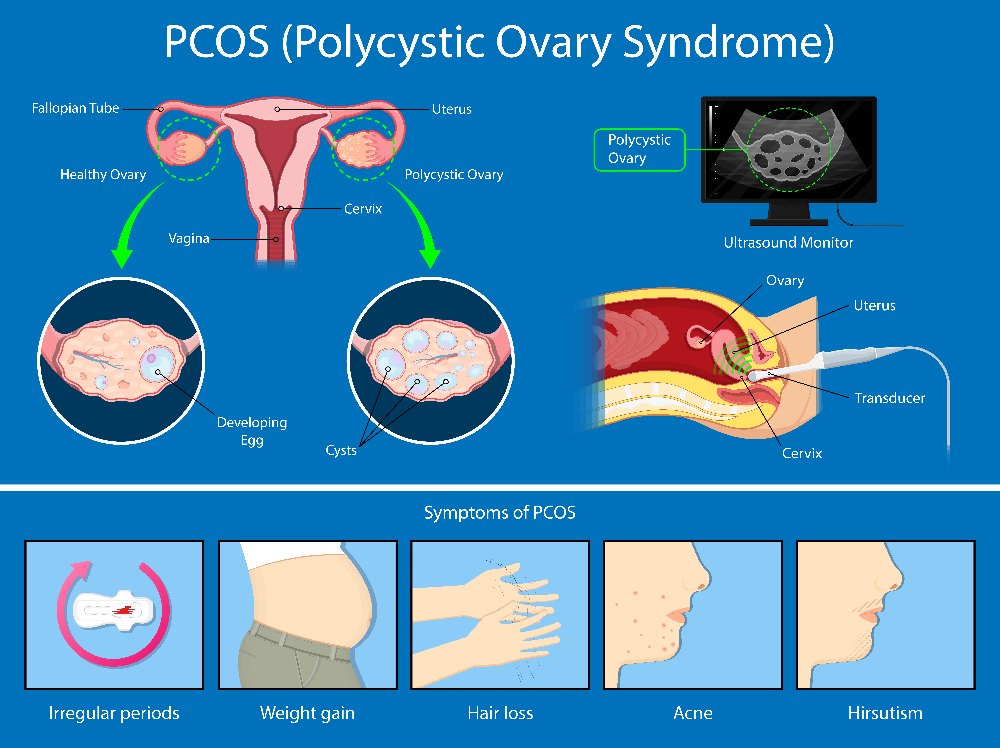PCOS, or Polycystic Ovary Syndrome, is a hormonal disorder characterized by enlarged ovaries containing numerous small cysts. These cysts are not harmful but can lead to hormonal imbalances, disrupting the menstrual cycle and potentially causing fertility issues.
Causes of PCOS
The exact cause of PCOS remains unknown, but several factors are believed to contribute to its development:
1. Hormonal Imbalance: Elevated levels of androgens (male hormones) such as testosterone in women can disrupt the normal function of ovaries.
2. Insulin Resistance: Many women with PCOS have insulin resistance, where the body’s cells do not respond effectively to insulin. This can lead to elevated insulin levels and contribute to the hormonal irregularities seen in PCOS.
3. Genetics: There appears to be a genetic component to PCOS, as it tends to run in families.
Symptoms of PCOS
PCOS presents with a variety of symptoms that can vary in severity:
1. Irregular Menstrual Cycles: Women with PCOS often experience irregular periods, or they may have fewer than eight menstrual cycles a year.
2. Excess Androgen: Elevated levels of male hormones can lead to symptoms such as acne, excessive facial and body hair (hirsutism), and male-pattern baldness.
3. Polycystic Ovaries: Enlarged ovaries containing multiple small follicles that can be detected via ultrasound.
4. Fertility Issues: Difficulty getting pregnant due to irregular ovulation or lack of ovulation.
5. Other Symptoms: Weight gain, fatigue, mood swings, and sleep disturbances are also commonly reported by women with PCOS.
Risk Factors for PCOS
Several factors can increase the risk of developing PCOS:
1. Family History: Having a mother or sister with PCOS increases your chances of developing the condition.
2. Insulin Resistance: Women who are overweight or obese are more likely to develop insulin resistance, which in turn increases the risk of PCOS.
3. Ethnicity: Certain ethnic groups, such as South Asians, are at higher risk of PCOS.
Treatment Options for PCOS
While PCOS cannot be cured, its symptoms can be managed effectively. Treatment options typically focus on addressing specific concerns such as irregular periods, infertility, and excessive hair growth. Dr. Sarita Agarwal, as a dedicated gynecologist in Pratap Nagar, Jaipur, offers comprehensive treatment plans tailored to each patient’s needs. Treatment may include:
1. Lifestyle Modifications: Healthy eating, regular exercise, and weight management can help improve insulin sensitivity and regulate menstrual cycles.
2. Medications: Birth control pills, anti-androgen medications, and insulin-sensitizing drugs may be prescribed to manage symptoms.
3. Fertility Treatments: For women trying to conceive, fertility medications such as clomiphene citrate or assisted reproductive technologies (ART) may be recommended.
4. Skin and Hair Treatments: Options include topical treatments for acne and excess hair, as well as laser therapy for hair removal.
Conclusion
PCOS is a complex condition that requires personalized care and attention. As a trusted gynecologist in Pratap Nagar, Jaipur, Dr. Sarita Agarwal emphasizes the importance of early diagnosis and comprehensive management to improve the quality of life for women with PCOS. By addressing the underlying hormonal imbalances and associated symptoms, Dr. Agarwal strives to empower her patients to lead healthier, more fulfilling lives. If you suspect you may have PCOS or have been diagnosed with the condition, seeking expert medical advice and guidance is crucial. Contact Dr. Sarita Agarwal’s clinic today to schedule a consultation and take the first step towards managing your PCOS effectively.






Comments